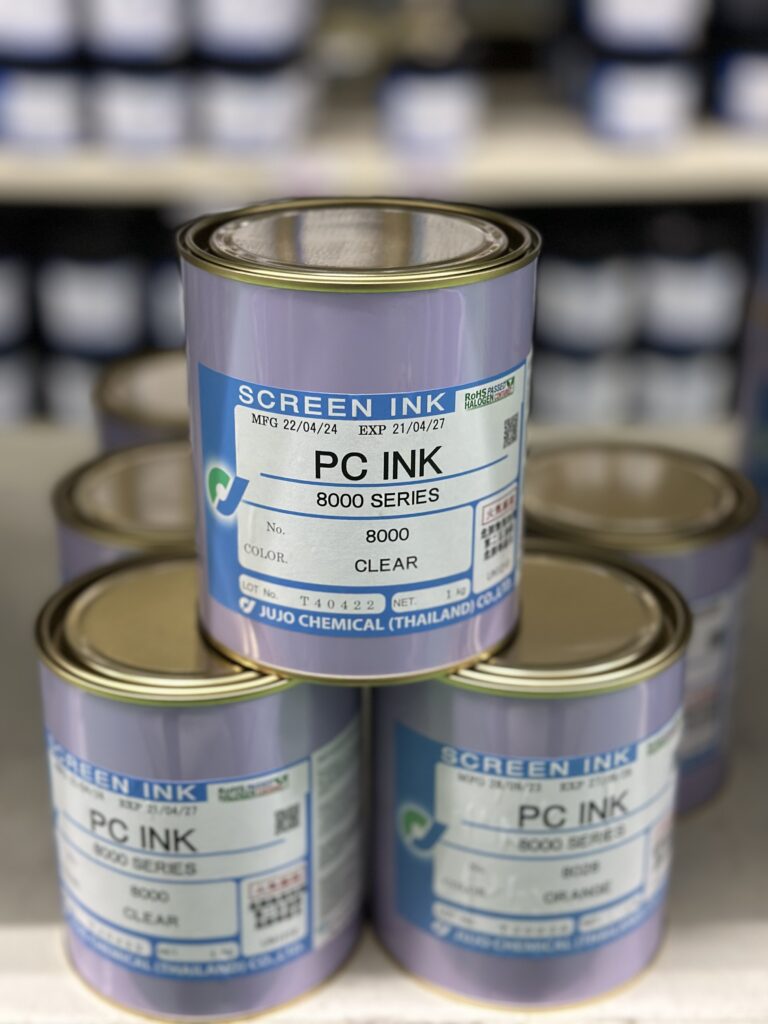8000 SERIES PC INK
Properties
No cracking on substrates.Alcohol resistance. Excellent flexibility. Polycarbonate, Acryl, ABS.Especially for industrial applications.

INTRODUCTIONS
8000 SERIES PC INK is designed for industrial meters/name plates made of polycarbonate. PC INK is evaporative drying type of ink and has excellent flexibility.
APPLICATIONS
Industrial meters / nameplates made of polycarbonate ABS, rigid vinyl.
CHARACTERISTICS
PC INK does not make the substrate crack. Good adhesion.
Good printability. Neither crawling nor pin-holes happens.
Excellent flexibility. It is easy to process such as punching or molding.
Excellent properties are obtained.
HOW TO USE
Dilute the ink with PC THINNER(standard drying, slow drying). PC RETARDER or PC SPECIAL RETARDER is recommended to print fine patterns. Do not use other thinner as polycarbonate cracks.
DRYING
Substrate : polycarbonate sheet.
Mesh : 250 meshes/inch. Pattern
Pattern : 60 x 60mm solid print.
| THINNER | Adding quantity | Drying method | Tack free |
|---|---|---|---|
| PC THINNER STANDARD | 25 % | Room temp.25°C(77°F) | Approx.10 min. |
| 25 % | Heat dry 60°C(140°F) | Approx. 1 min. | |
| PC THINNER SLOW | 25 % | Room temp.25°C(77°F) | Approx.15 min. |
| 25 % | Heat dry 60°C(140°F) | Approx. 1 min. | |
| PC RETARDER | 25 % | Room temp.25°C(77°F) | Approx.20 min. |
| 25 % | Heat dry 60°C(140°F) | Approx. 2 min. | |
| SPECIAL RETARDER | 25 % | Room temp.25°C(77°F) | Approx.40 min. |
| 25 % | Heat dry 60°C(140°F) | Approx. 4 min. |
STENCIL & WASHING UP
Use photo-stencil. Use VINYL CLEANING THINNER.
COLORS & TYPE OF PACKING
Standard 18 colors, EXO(extra opaque) 9 colors, matting agent. 1 kg can.
PRECAUTIONS
- When polycarbonate cracks on molding, anneal the substrate.
- PC INK does not have good heat resistance.
- PC INK has rather strong odor. 8100 SERIES is recommended as low-odor type.
- PC INK does not adhere to acryl well. 8100 SERIES is recommendable for acryl.
- Please refer to MSDS before use.
- Be sure to do trial print before commercial run to confirm that the product fits the purposes.
POINTS TO PRINT ON POLYCARBONATE
- Polycarbonate is not resistant to solvent. If the substrate is attacked by the solvent contained in the ink, crack or distortion happen, which spoils the toughness of the product. It is essential to choose right ink.
- As polycarbonate is used as durable substrate, the ink printed on it must have the efficient toughness and durability.
- Polycarbonate as industrial material is processed after printing such as punching and molding. Ink must bear these conditions.
PHYSICAL PROPERTIES
| TEST ITEMS | TEST METHODS | RESULTS |
|---|---|---|
| Adhesion | Cross hatch, peeling test | 100/100 Passed |
| Hardness | JIS K5400 8.4 scratch by pencil. Load : 1kg | 2H |
| Impact resistance | JIS K5400 8.3.2 Du Pont Impact test 1/2 inch, 500 grams, 50 cm |
No peeling off |
| Bending resistance | JIS K5400 8.1 diameter 2mm | No peeling off |
| Punching resistance | Cutting off by punching | No peeling off |
| Weathering resistance | Sunshine Weather-O-Meter 700 hours | Passed |
| Heat resistance | 100°C(212°F) 24 hours | Passed |
| Coldness resistance | -40°C(-40°F), 24 hours | Passed |
| Humidity resistance | 60°C(140°F), 95%RH, 96 hours | Passed |
| Water-proofness | Immersion in water of 40°C(104°F) for 24 hours | Passed |
| Heat cycle | -30°C(-22°F) 2.5hrs –> 25°C(77°F) 0.5hrs –> 100°C(212°F) 2.5 hours –> 25°C(77°F) 0.5hrs : 4 cycles | Passed |
| Alcohol resistance | Rubbing with 99.5% ethanol | >100 times |
- Value in this information is obtained in experiment and no guarantee is implied.
- Weathering resistance depends on the color. Please refer to lightfastness chart Matched colors, especially smoke colors and pale colors, are inferior to standard colors in weathering resistance.
Applications Usage
Polycarbonate, Acryl, ABS.
Especially for industrial applications.